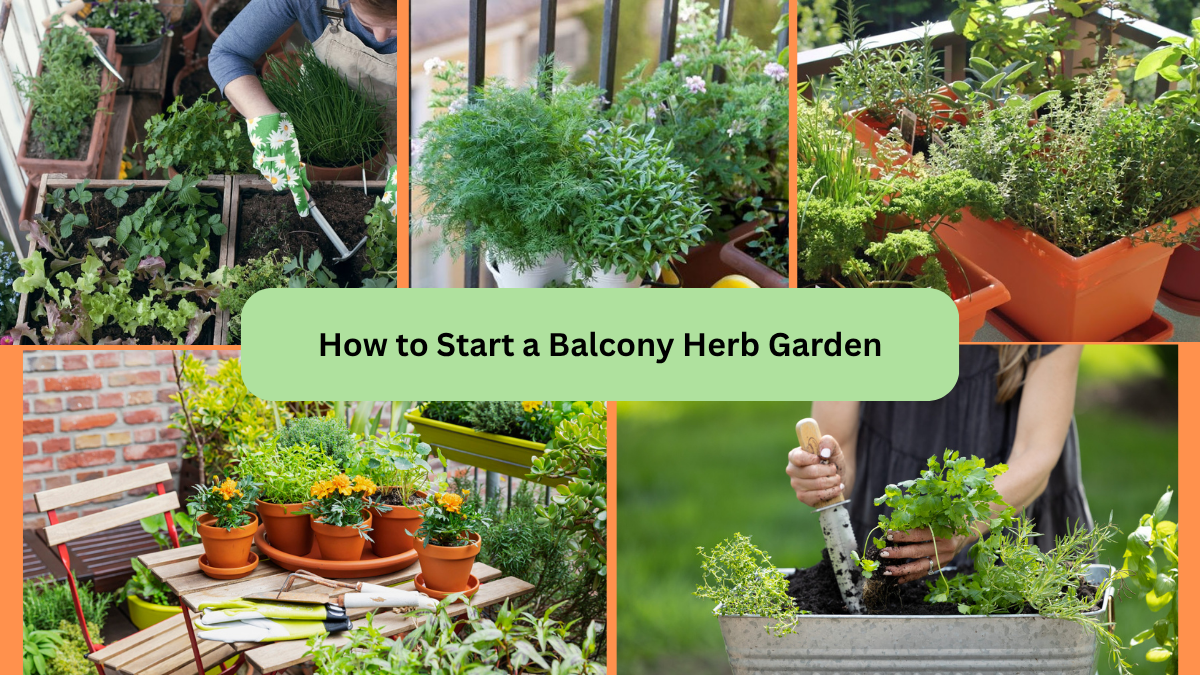Do you love the idea of snipping fresh herbs right from your balcony for your morning tea, evening pasta, or weekend barbecue? Starting a balcony herb garden is one of the easiest and most rewarding ways to green up your living space, even if you have limited room.
With a bit of planning and a sunny corner, you can grow your favorite culinary and medicinal herbs right outside your door. Not only does it beautify your balcony, but it also provides fresh, organic ingredients year-round.
In this detailed guide, we’ll walk you through everything you need to know about how to start a balcony herb garden — from selecting herbs and setting up containers to watering, harvesting, and caring for your plants.
Why Start a Balcony Herb Garden?
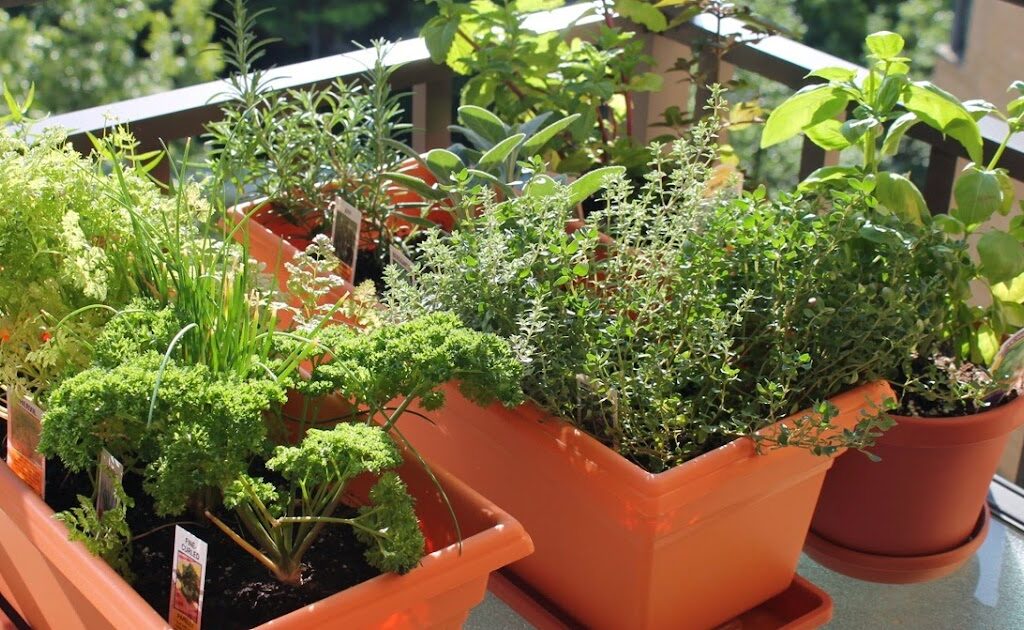
Balcony herb gardening offers a host of benefits beyond the delicious flavors you’ll add to your meals:
- Fresh herbs at your fingertips anytime you need them.
- Beautifies small spaces and adds natural charm to urban settings.
- Saves money on store-bought herbs.
- Encourages a greener, more sustainable lifestyle.
- Relieves stress and improves air quality.
- Requires minimal space, tools, and maintenance.
Plus, most herbs are hardy, easy to grow, and thrive in containers.
Choosing the Right Location on Your Balcony
Before picking up pots and seeds, assess your balcony’s conditions:
Sunlight
Most herbs need at least 4–6 hours of direct sunlight daily to thrive.
- A south-facing balcony is ideal.
- East- or west-facing spaces work with slightly fewer sun hours.
- North-facing balconies are suitable for shade-loving herbs like mint, parsley, and coriander.
Tip: Use hanging planters, wall-mounted shelves, or vertical racks if space is limited.
Best Herbs for a Balcony Garden
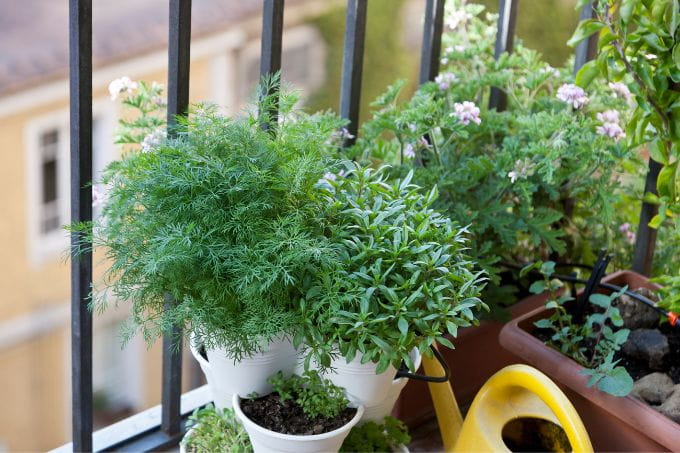
Start with easy, fast-growing herbs that suit your cooking and wellness needs. Here’s a list of beginner-friendly balcony herbs:
Culinary Herbs:
- Basil — Loves warmth and sunlight. Great for Italian, Thai, and Mediterranean dishes.
- Mint — Thrives in partial shade. Use for teas, desserts, and refreshing drinks.
- Rosemary — A woody herb needing full sun and well-drained soil.
- Parsley — Prefers cooler spots with morning sunlight.
- Coriander (Cilantro) — Quick-growing, ideal for salads, curries, and garnishes.
- Thyme — Hardy, drought-tolerant, and flavorful in stews and roasts.
- Oregano — Perfect for pizza and pasta sauces, loves full sun.
Medicinal & Aromatic Herbs:
- Lemongrass — Fragrant, mosquito-repelling, and wonderful in teas.
- Chamomile — Calming flowers for herbal infusions.
- Lavender — Beautiful, aromatic, and good for relaxing teas and crafts.
Choosing the Right Containers
Container gardening is perfect for balconies. You’ll need pots that match your herbs’ growing habits and balcony space.
Container Guidelines:
- Use clay, ceramic, plastic, or metal pots with proper drainage holes.
- 6–12 inch pots work well for individual herbs.
- Use window boxes, vertical planters, or hanging baskets for small spaces.
- Avoid water-collecting saucers in rainy weather to prevent root rot.
Choosing the Right Soil
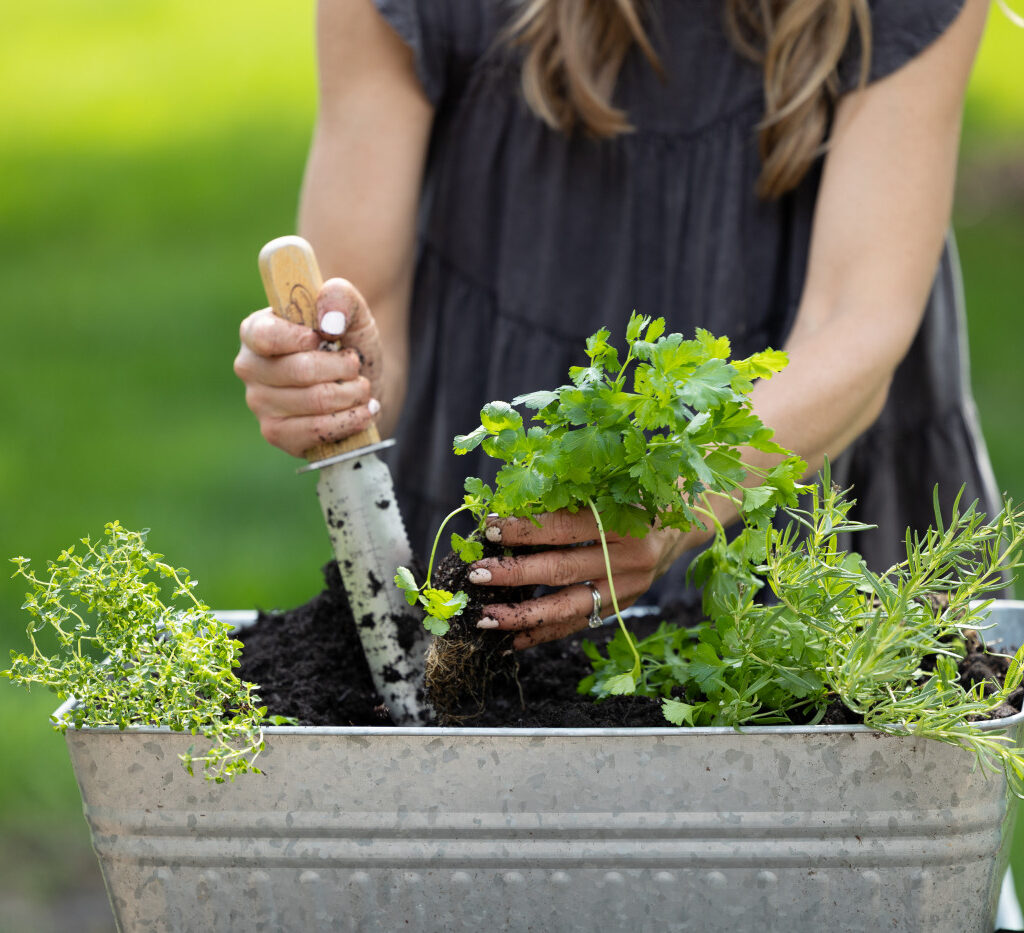
Herbs prefer well-draining, fertile soil that prevents waterlogging.
Ideal soil mix:
- 2 parts good-quality potting soil
- 1 part compost
- 1 part coarse sand or perlite (for better drainage)
Avoid heavy garden soil as it compacts in containers and retains too much moisture.
How to Plant Your Balcony Herb Garden
You can grow herbs either from seeds or seedlings (young plants).
Seedlings are quicker and easier for beginners, while seeds are more economical and satisfying to grow.
Steps for Planting:
- Fill containers with your prepared soil mix.
- Sow seeds according to packet instructions (usually about ¼ inch deep) or plant seedlings at the same depth as their nursery pot.
- Water gently to moisten the soil.
- Label each pot for easy identification.
- Place pots in sunny, sheltered spots on your balcony.
Watering and Maintenance
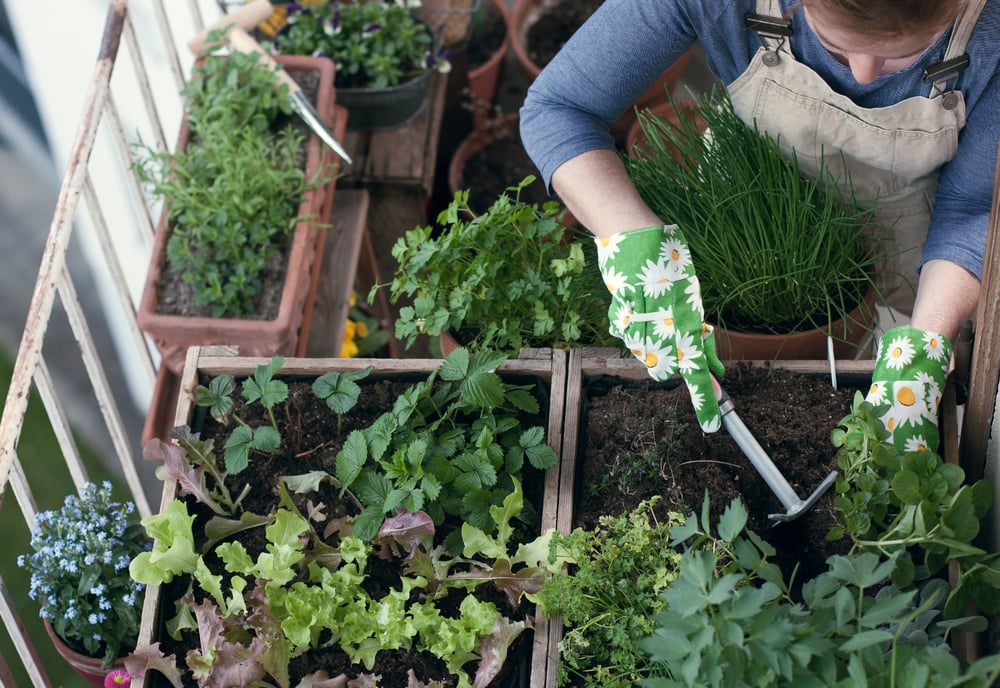
Watering is crucial for container-grown herbs, as soil dries faster in pots than in-ground beds.
Watering Tips:
- Check soil moisture daily, especially in hot weather.
- Water early in the morning or late afternoon.
- Avoid waterlogged soil — most herbs prefer slightly dry soil between watering.
- Herbs like basil, parsley, and coriander need more frequent watering than drought-tolerant rosemary and thyme.
Tip: Use a watering can with a fine spout to avoid splashing soil.
Fertilizing Your Herb Garden
Feed your balcony herbs with a light, organic fertilizer every 3–4 weeks during the growing season.
Natural options:
- Homemade compost
- Vermicompost
- Diluted organic liquid fertilizers
Avoid over-fertilizing as it can lead to less aromatic, leggy herbs.
Pruning, Harvesting, and Propagating
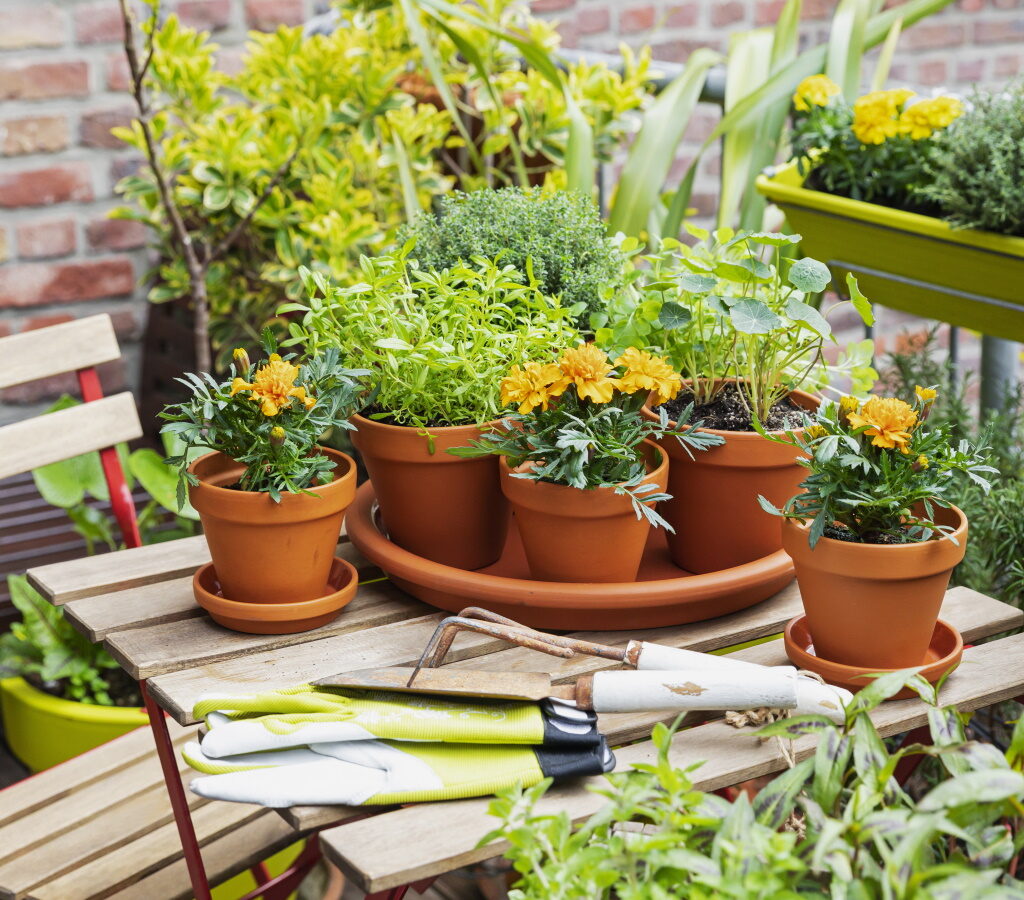
Harvesting:
- Regularly pinch or snip off herb leaves and stems to encourage bushier growth.
- Avoid removing more than one-third of a plant at a time.
- Harvest in the morning hours when essential oils are strongest.
Pruning:
- Remove dead, yellowing, or damaged leaves.
- Pinch off flower buds to maintain leaf flavor.
Propagating:
- Many herbs like mint, rosemary, basil, and oregano can be easily propagated through cuttings.
- Place a 4–5 inch stem cutting in water until roots develop, then transfer to soil.
Natural Pest Control
While herbs are relatively pest-resistant, aphids, spider mites, and whiteflies may occasionally appear.
Eco-friendly solutions:
- Spray leaves with a mild soap-water solution.
- Wipe leaves with a damp cloth.
- Use neem oil spray for persistent infestations.
- Encourage natural predators like ladybugs if possible.
Seasonal Care
- In hot climates, move tender herbs like coriander and parsley to shadier spots in summer.
- Prune woody herbs like rosemary and thyme before the rainy season to prevent rot.
- In cold climates, bring pots indoors during frost or use balcony covers.
Benefits of a Balcony Herb Garden
- Fresh, chemical-free herbs anytime.
- Beautifies your outdoor living space.
- Aromatic environment for relaxation.
- Easy, beginner-friendly hobby.
- Eco-friendly and sustainable food source.
- Encourages mindful, nature-connected living.
Final Thoughts
Starting a balcony herb garden is one of the simplest and most rewarding ways to add freshness, greenery, and flavor to your home. Whether you’re new to gardening or simply looking to make better use of your balcony, herbs are the perfect starting point.
With a bit of sunlight, the right containers, regular watering, and a sprinkle of care, you’ll soon be harvesting your own aromatic, organic herbs for teas, soups, and garnishes — all from a charming, green balcony retreat.
So why wait? Start planting today and turn your balcony into a lush, edible escape!
